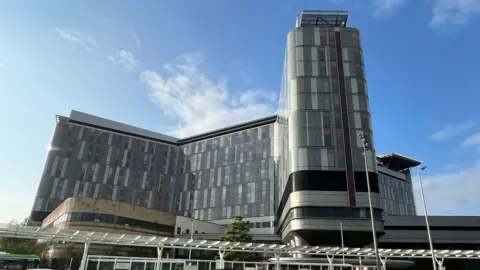Health board comms chief denies infections 'cover up'
 BBC
BBCThe Director of Communications at NHS Greater Glasgow and Clyde has told a public inquiry there was never any “deliberate concealment” or “misrepresentation” of infection outbreaks at the Queen Elizabeth University Hospital.
Sandra Bustillo said her team was “never involved” in any instances of “concealment or misrepresentation” over the deaths of patients, but admitted frequent leaks had “eroded trust”.
The Scottish Hospitals Inquiry is investigating the construction of the Queen Elizabeth University Hospital (QEUH) campus in Glasgow, which includes the Royal Hospital for Children.
It was set up after a number of patient deaths including that of 10-year-old cancer patient Milly Main.
Child cancer wards were closed in 2018 following a number of infection outbreaks, with patients moved to the adult hospital so the water and ventilation system could be upgraded.
Families have been critical of the health board for what they say has been a lack of transparency and honesty about the seriousness of problems at the hospital, which opened in 2015.
NHS Greater Glasgow and Clyde (NHSGGC) spent £8.9m on ventilation system improvements at the £840m hospital following Ms Main’s death.
Communications director Ms Bustillo said staff had been “open and transparent” in how they communicated with families and the media when dealing with a series infection incidents recorded at the hospital.
She told the inquiry the process of agreeing statements could be a lengthy one involving clinicians, senior staff and often the Scottish Government.
In written evidence she said sometimes delays in the release of information “resulted in unwarranted criticisms of a lack of openness and transparency.”
She said: “At no time were I or my team involved, or aware of, any deliberate concealment or misrepresentation of information on the part of NHS GGC in our public communications.”
Ms Bustillo also said the leaking of internal documents to journalists and politicians “eroded” trust and “unjustly” resulted in accusations of a cover up.
She told the inquiry it ultimately contributed to the health board being put in special measures.
NHSGGC was escalated to stage four of the NHS Board Performance Escalation Framework by the Scottish Government in 2019 and 2020 over issues with communication and infection prevention and control.
The Scottish government said further action was necessary at that point to help “increase public confidence”.
'Social listening'
Ms Bustillo was asked about NHSGGC conducting “social listening” of certain individuals including Louise Slorance, the widow of a senior government official who died from Covid in the hospital.
She said that she had consulted with other health boards on the use of social listening technology.
Ms Bustillo admitted that while three other boards had the technology, none had used it.
She told the inquiry no individuals are being followed anymore.
The inquiry, which is being held in Edinburgh, continues.
